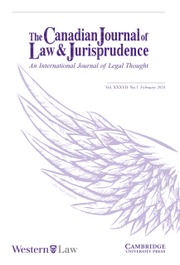Rethinking Punishment
- Author: Leo Zaibert, Union College, New York
- Date Published: April 2018
- availability: Available
- format: Paperback
- isbn: 9781316645390
Paperback
Other available formats:
Hardback, eBook
Looking for an examination copy?
This title is not currently available for examination. However, if you are interested in the title for your course we can consider offering an examination copy. To register your interest please contact [email protected] providing details of the course you are teaching.
-
The age-old debate about what constitutes just punishment has become deadlocked. Retributivists continue to privilege desert over all else, and consequentialists continue to privilege punishment's expected positive consequences, such as deterrence or rehabilitation, over all else. In this important intervention into the debate, Leo Zaibert argues that despite some obvious differences, these traditional positions are structurally very similar, and that the deadlock between them stems from the fact they both oversimplify the problem of punishment. Proponents of these positions pay insufficient attention to the conflicts of values that punishment, even when justified, generates. Mobilizing recent developments in moral philosophy, Zaibert offers a properly pluralistic justification of punishment that is necessarily more complex than its traditional counterparts. An understanding of this complexity should promote a more cautious approach to inflicting punishment on individual wrongdoers and to developing punitive policies and institutions.
Read more- Proposes a truly new way of thinking about the justification of punishment
- Provides an up-to-date overview of the field
- Identifies a number of widespread errors in alternative approaches to punishment
Reviews & endorsements
'In his new book, Leo Zaibert has created a formidable challenge to philosophers who think that punishment can only be another word for certain kinds of crime or suffering prevention, and that the notion of deserved suffering does not make philosophical sense. The book is a must-read for all who think that the idea of justified retributive punishment excludes forgiveness and implies some kind of an eye-for-an-eye punishment. The book defends G. E. Moore’s famous notion of organic whole, and is itself a very good example of one.' Ingvar Johansson, Professor Emeritus in Theoretical Philosophy at Umeå University, Sweden
See more reviews'A wonderfully ambitious and passionate book by one of the most original and incisive scholars working at the intersection of philosophy and criminal law, in the great tradition of Luis Jiménez de Asúa.' Markus D. Dubber, Director of the Centre for Ethics, University of Toronto
'Many retributivists take it as a given that it is intrinsically good to give people what they deserve. Leo Zaibert’s book offers a thorough and refreshing defense of that assumption. Zaibert thus provides the philosophical bedrock on which most theorists have been standing upon all along.' Kimberly Kessler Ferzan, Harrison Robertson Professor of Law, University of Virginia
'Zaibert introduces a novel perspective for thinking about traditional problems in attempts to justify punishment. Moral and legal philosophers who despair that we are stuck at an impasse and that nothing new and important remains to be said should put Rethinking Punishment at the top of their pile.' Douglas Husak, Distinguished Professor of Philosophy, Rutgers University, New Jersey
'I think the books in the field I read are usually intelligent, sometimes sophisticated, but seldom, if ever, is their central insight profound (if true). I think the central insight Zaibert offers - punishment ends moral innocence - really is quite profound.' Stephen P. Garvey, Cornell University, New York
'Every so often a book is published within a particular area of philosophy that challenges the prevailing orthodoxy and opens up new vistas for exploring and deepening our understanding. Leo Zaibert’s excellent Rethinking Punishment does just this. This outstanding book shakes up conventional punishment theory and calls it out for its simplistic presuppositions given our immensely complex moral reality. The book provides a clear and nuanced way forward for theories of punishment, and in doing so makes a significant, important, and lasting contribution to moral theory in general. We are in his debt.' Stephen De Wijze, University of Manchester
'Rethinking Punishment has many virtues and defends its key propositions with admirable clarity, insight, and erudition. The book is more than just another book about punishment theory ...' Youngjae Lee, Rutgers
'Leo Zaibert’s Rethinking Punishment … is a rigorous, subtle, and penetrating analysis of the issues surrounding punishment; and it is a profoundly philosophical work that exhibits careful and well-informed philosophical argument at its best … By my lights it is the most impressive and sophisticated and appealing defense of retributivism yet developed.' Bruce N. Waller, Journal of Moral Philosophy
Customer reviews
Not yet reviewed
Be the first to review
Review was not posted due to profanity
×Product details
- Date Published: April 2018
- format: Paperback
- isbn: 9781316645390
- length: 274 pages
- dimensions: 229 x 153 x 15 mm
- weight: 0.41kg
- availability: Available
Table of Contents
1. Punishment as a Problem: I. Punishment, Theodicies, and Meaning
II. The Axiological and the Deontic
III. Monism and Pluralism
IV. Conflicts, Remainders, and Forgiveness
V. Overview
2. Prolegomena to any Future Axiology: I. Ideal Utilitarianism, Desert, and the Richness of the Moral Universe
II. Organic Wholes and the Sounds of Justice
III. Variance and its Discontents
IV. Conclusion
3. The Persistence of Consequentialism: I. Giving Desert its Due
II. The Pieties of Impunity
III. The Avoidance of Suffering and Sour Grapes
IV. Conclusion
4. The Gerrymandering Gambit: Retributivism in the Budget Room: I. Holistic Retributivism and Sharing Stages
II. Emotions, Moral Luck, and Arrogance
III. Cutting Oneself Off from the Human Condition
IV. Punishment, Revenge, and the Pale Cast of Thought
V. Talking to Oneself
VI. Conclusion
5. Communication, Forgiveness, and Topography: I. The Limits of Communication
II. Games People Play
III. A Variety of Skepticisms
IV. Tales from Topographic Oceans
V. Conclusion
6. The Allure of the Ledger: Better Than a Dog Anyhow: I. Moral Luck and Moral Mathematics
II. The Critique of the Morality System
III. Punishment, the Peculiar Institution
IV. Pluralism, the Value of Forgiveness, and the Messiness of the World
V. Conclusion
7. The Right Kind of Complexity: I. Retributivism and Magical Thinking
II. Utilitarianism, Forgiveness, and Moral Reasons
III. Micro-Managing Life
IV. From Unconditional Forgiveness to Unconditional Punishment
V. Conclusion
8. The Jugglery of Circumstances: Dirty Hands and Impossible Stories: I. Punishing Innocence
II. Moral Taints: From Aulis to Theresienstadt
III. Moral Brilliance and Moral Imagination
IV. Conclusion.
Sorry, this resource is locked
Please register or sign in to request access. If you are having problems accessing these resources please email [email protected]
Register Sign in» Proceed
You are now leaving the Cambridge University Press website. Your eBook purchase and download will be completed by our partner www.ebooks.com. Please see the permission section of the www.ebooks.com catalogue page for details of the print & copy limits on our eBooks.
Continue ×Are you sure you want to delete your account?
This cannot be undone.
Thank you for your feedback which will help us improve our service.
If you requested a response, we will make sure to get back to you shortly.
×






